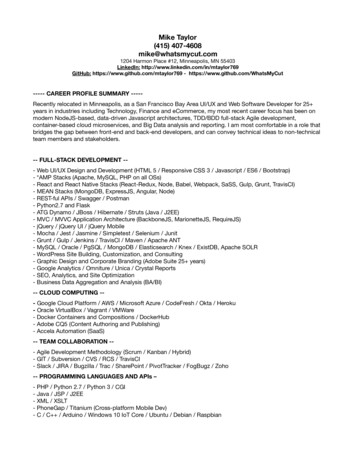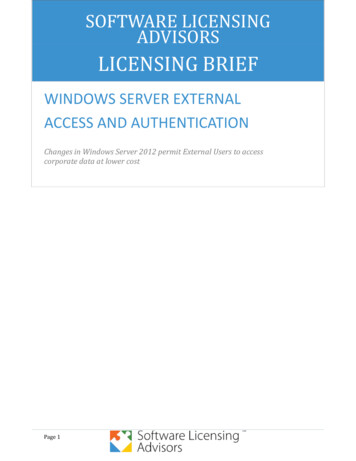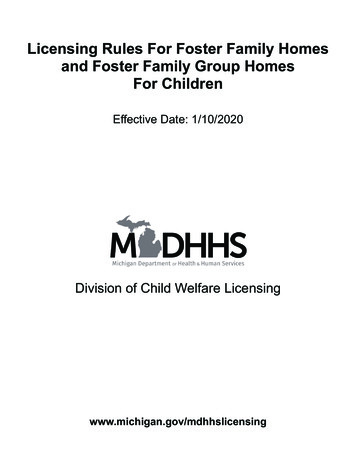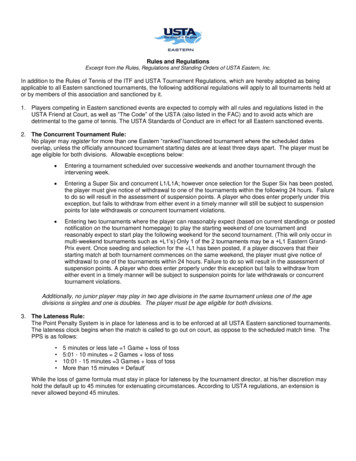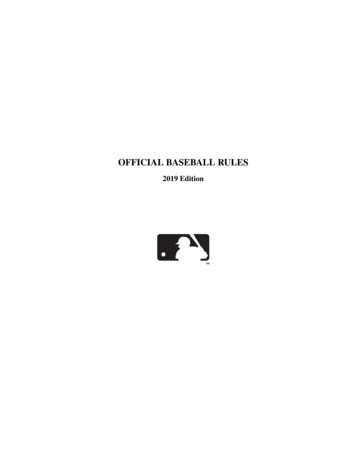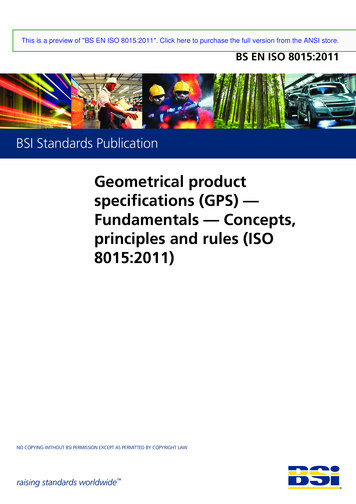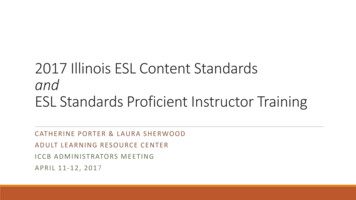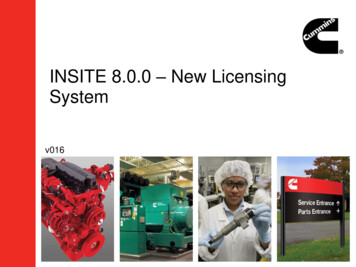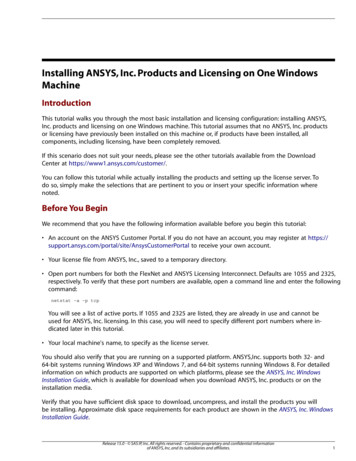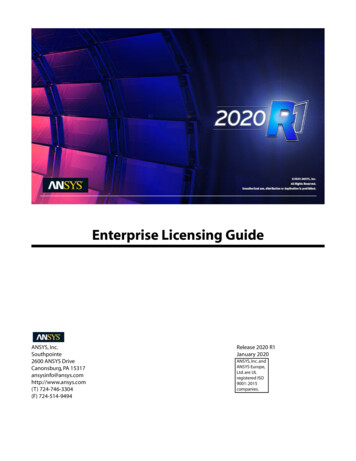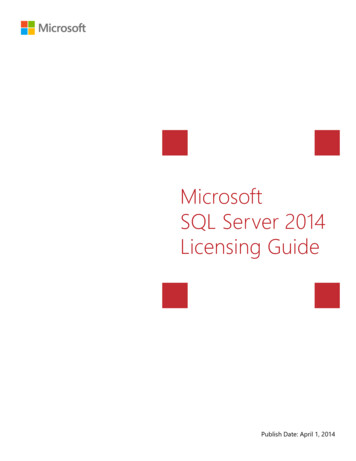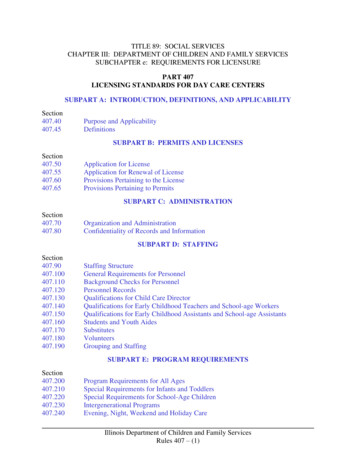
Transcription
TITLE 89: SOCIAL SERVICESCHAPTER III: DEPARTMENT OF CHILDREN AND FAMILY SERVICESSUBCHAPTER e: REQUIREMENTS FOR LICENSUREPART 407LICENSING STANDARDS FOR DAY CARE CENTERSSUBPART A: INTRODUCTION, DEFINITIONS, AND APPLICABILITYSection407.40407.45Purpose and ApplicabilityDefinitionsSUBPART B: PERMITS AND LICENSESSection407.50407.55407.60407.65Application for LicenseApplication for Renewal of LicenseProvisions Pertaining to the LicenseProvisions Pertaining to PermitsSUBPART C: ADMINISTRATIONSection407.70407.80Organization and AdministrationConfidentiality of Records and InformationSUBPART D: 07.140407.150407.160407.170407.180407.190Staffing StructureGeneral Requirements for PersonnelBackground Checks for PersonnelPersonnel RecordsQualifications for Child Care DirectorQualifications for Early Childhood Teachers and School-age WorkersQualifications for Early Childhood Assistants and School-age AssistantsStudents and Youth AidesSubstitutesVolunteersGrouping and StaffingSUBPART E: PROGRAM .240Program Requirements for All AgesSpecial Requirements for Infants and ToddlersSpecial Requirements for School-Age ChildrenIntergenerational ProgramsEvening, Night, Weekend and Holiday CareIllinois Department of Children and Family ServicesRules 407 – (1)
LICENSING STANDARDS FOR DAY CARE CENTERSOctober 25, 2020 – Updated pursuant to 2021.11 ITSUBPART F: STRUCTURE AND 7.300Enrollment and Discharge ProceduresDaily Arrival and Departure of ChildrenGuidance and DisciplineTransportationSwimming and WadingAnimalsSUBPART G: HEALTH AND 07.360Health Requirements for ChildrenHand WashingNutrition and Meal ServiceDiapering and Toileting ProceduresNapping and SleepingMedicationsSUBPART H: FACILITY AND EQUIPMENTSection407.370407.380407.390Physical Plant/Indoor SpaceEquipment and MaterialsOutdoor Play AreaSUBPART I: SEVERABILITY OF THIS PARTSection407.400Severability of this PartAPPENDIX AAPPENDIX BAPPENDIX CAPPENDIX DAPPENDIX EAPPENDIX FAPPENDIX GAPPENDIX HEquipment for Infants and ToddlersEquipment for Preschool ChildrenEquipment for School-Age ChildrenInfant Daily Food RequirementsMeal Patterns and Service Sizes for Child Care ProgramsResource Reference ListEarly Childhood Teacher Credentialing ProgramsPlayground Surfacing and Critical HeightIllinois Department of Children and Family ServicesRules 407 – (2)
LICENSING STANDARDS FOR DAY CARE CENTERSOctober 25, 2020 – Updated pursuant to 2021.11 ITAUTHORITY: Implementing and authorized by the Child Care Act of 1969 [225 ILCS 10] and theChildren's Product Safety Act [430 ILCS 125].SOURCE: Adopted and codified at 7 Ill. Reg. 9215, effective August 15, 1983; amended at 8 Ill.Reg. 8713, effective June 15, 1984; amended at 8 Ill. Reg. 24937, effective January 1, 1985;amended at 16 Ill. Reg. 7597, effective April 30, 1992; emergency amendment at 20 Ill. Reg. 11366,effective August 1, 1996, for a maximum of 150 days; emergency expired December 28, 1996;amended at 21 Ill. Reg. 923, effective January 15, 1997; amended at 22 Ill. Reg. 1728, effectiveJanuary 1, 1998; amended at 24 Ill. Reg. 17036, effective November 1, 2000; amended at 28 Ill.Reg. 3011, effective February 15, 2004; amended at 29 Ill. Reg. 4502, effective March 15, 2005;amended at 34 Ill. Reg. 4700, effective March 22, 2010; amended at 36 Ill. Reg. 13076, effectiveAugust 15, 2012; amended at 38 Ill. Reg. 17293, effective August 1, 2014; emergency amendment at42 Ill. Reg. 8555, effective May 9, 2018, for a maximum of 150 days; emergency expired October 5,2018; amended at 43 Ill. Reg. 224, effective January 1, 2019; emergency amendment at 44 Ill. Reg.5734, effective March 20, 2020, for a maximum of 150 days; emergency amendment at 44 Ill. Reg.10170, effective May 29, 2020, for a maximum of 150 days; emergency amendment to emergencyrule at 44 Ill. Reg. 11079, effective June 12, 2020, for the remainder of 150 days; emergencyamendment to emergency rule at 44 Ill. Reg. 11577, effective June 24, 2020, for the remainder of150 days; emergency rule effective May 29, 2020, as amended June 12, 2020 and June 24, 2020,expired October 25, 2020; amended at 44 Ill. Reg. 16138, effective September 18, 2020.Illinois Department of Children and Family ServicesRules 407 – (3)
LICENSING STANDARDS FOR DAY CARE CENTERSOctober 25, 2020 – Updated pursuant to 2021.11 ITThis page intentionally left blank.Illinois Department of Children and Family ServicesRules 407 – (4)
LICENSING STANDARDS FOR DAY CARE CENTERSOctober 25, 2020 – Updated pursuant to 2021.11 ITSUBPART A: INTRODUCTION, DEFINITIONS, AND APPLICABILITYSection 407.40 Purpose and Applicabilitya)The purpose of this Part is to prescribe the minimum standards for licensure as a daycare center and to describe how to apply for a license. This Part also establishesrequirements for the daily operation of day care centers that serve children. TheChild Care Act of 1969 excludes some facilities from the requirement to be licensed.These exclusions from the licensing requirement may be found in Section 2.09 of theChild Care Act of 1969 [225 ILCS 10/2.09] and are explained in Department rules 89Ill. Adm. Code 377, Facilities and Programs Exempt from Licensure.b)The licensing standards set forth in this Part are applicable to day care centers asdefined in the Child Care Act of 1969 that are also known as child care centers.c)All the standards of this Part apply to partially exempt programs as defined inSection 407.45 unless the standard states those programs are exempt.d)Individuals, corporations, associations and groups may write to the Department ofChildren and Family Services and request a declaratory ruling with regard to theapplicability of this Part to their circumstances when the requestor has requested aninterpretation from the local licensing authority, but has been unable to obtain suchan interpretation or is not satisfied with the response obtained.e)Such requests for declaratory rulings shall be addressed to the Department ofChildren and Family Services, Office of Rules and Procedures, 406 E. MonroeStreet, Station # 65, Springfield, Illinois 62701, shall fully outline the facts of theirinquiry, shall provide names and addresses of any Department staff who have beeninvolved in evaluating the applicability of this Part to their circumstances, and shallinclude a copy of any written interpretations or directions received from the locallicensing authority.f)The Department may provide declaratory rulings upon receipt of the initial request ormay ask the inquirer to provide additional information within 15 days before adeclaratory ruling is issued. Failure to provide the additional requested informationwithin the 15-day period will terminate the request for a declaratory ruling.g)A declaratory ruling regarding the applicability of this Part upon the inquirer will beissued in writing within 60 days after receipt of a complete inquiry which fully statesthe question and accurately outlines the facts of the inquiry.h)A request for a declaratory ruling shall not delay the implementation of any licensingenforcement action including but not limited to corrective plans, refusal to renew,revocation or other enforcement activities.Illinois Department of Children and Family ServicesRules 407 – (5)
LICENSING STANDARDS FOR DAY CARE CENTERSOctober 25, 2020 – Updated pursuant to 2021.11 ITi)Declaratory rulings shall not be appealable. (Section 5-150(a) of the IllinoisAdministrative Procedure Act [5 ILCS 100/5-150(a)])j)The Department shall maintain as a public record in its principal office and makeavailable for public inspection and copying any such declaratory rulings. TheDepartment shall delete trade secrets or other confidential information from theruling before making it available to the public. (See Section 5 of the Freedom ofInformation Act [5 ILCS 140/5].)(Source: Amended at 28 Ill. Reg. 3011, effective February 15, 2004)Section 407.45 Definitions"Accredited college or university" means a college or university that has beenaccredited by a regional or national institutional accrediting association recognizedby the U.S. Department of Education or a non-governmental recognition counterpart."Age-appropriate safety restraint" for a child under 4 years of age means a childrestraint system (infant carrier, infant/toddler seat, or convertible safety seat) thatmeets the standards of the United States Department of Transportation designed torestrain, seat or position children. For a child 4 years of age or older, an ageappropriate safety restraint means a child restraint system or seat belt (lap belt or lapshoulder belt combination)."Attendance" means the total number of children present at any one time."Authorized representative of the Department" means a licensing representative orany person acting on behalf of the Director of the Department."Background check" means:a criminal history check via fingerprints of persons age 17 and over that aresubmitted to the Illinois State Police and the Federal Bureau of Investigation(FBI) for comparison to their criminal history records, as appropriate;a check of the Statewide Automated Child Welfare Information System(SACWIS) and other states' child protection systems, as appropriate, todetermine whether an individual has been alleged or indicated as aperpetrator of child abuse or neglect; anda check of the Illinois Sex Offender Registry.Illinois Department of Children and Family ServicesRules 407 – (6)
LICENSING STANDARDS FOR DAY CARE CENTERSOctober 25, 2020 – Updated pursuant to 2021.11 IT"Behavior Support Plan" means a written, planned and culturally and linguisticallyappropriate schedule of action agreed upon by the program staff, parents/guardians,and qualified professional resources assigned:to assist a child, a family, caregivers, programs or teachers, and directors onhow the program reflects on and modifies the program, classroom, andlearning environment practices; andto address the identification of serious and repeated patterns of challengingbehavior.The behavior support plan must be fully implemented before initiating theprogram transition plan."CANTS" means the Child Abuse and Neglect Tracking System operated andmaintained by the Department. This system is being replaced by the StatewideAutomated Child Welfare Information System (SACWIS)."Challenging behavior" means any serious and repeated pattern of any behavior, orperception of behavior, that interferes with a child's ability to engage indevelopmentally appropriate self-regulation or cognitive and prosocial engagementwith peers or adults."Child" means any person under 18 years of age. (Section 2.01 of the Child CareAct of 1969 [225 ILCS 10])"Child care facility" means any person, group of persons, agency, association ororganization, whether established for gain or otherwise, who or which receives orarranges for care or placement of one or more children, unrelated to the operator ofthe facility, apart from the parents, with or without the transfer of the right ofcustody in any facility as defined in the Child Care Act of 1969, established andmaintained for the care of children. (Section 2.05 of the Child Care Act of 1969)"Child care staff" means all staff members providing direct care to children."Consultant" means a person providing technical assistance or advice regarding anyaspect of the program operation."Corporal punishment" means hitting, spanking, swatting, beating, shaking, pinching,excessive exercise, exposure to extreme temperatures, and other measures thatproduce physical pain."Cot" means a comfortable, safe and child-sized alternative bed made of resilient,sanitizable fabric, that is on legs or otherwise above the floor and can be stored toallow for air flow.Illinois Department of Children and Family ServicesRules 407 – (7)
LICENSING STANDARDS FOR DAY CARE CENTERSOctober 25, 2020 – Updated pursuant to 2021.11 IT"Day care center" means any child care facility which regularly provides day carefor less than 24 hours per day for more than 8 children in a family home or morethan 3 children in a facility other than a family home, including senior citizenbuildings. The term does not include:programs operated by public or private elementary school systems orsecondary level school units or institutions of higher learning that servechildren who shall have attained the age of 3 years;private entities on the grounds of public or private elementary or secondaryschools that serve children who have attained the age of 3 years, except thatthis exception applies only to the facility and not to the private entities'personnel operating the program;programs or that portion of the program which serves children who shallhave attained the age of 3 years and which are recognized by the State Boardof Education;educational program or programs serving children who shall have attainedthe age of 3 years and which are operated by a school which is registeredwith the State Board of Education and which is recognized or accredited by arecognized national or multi-state educational organization or associationwhich regularly recognizes or accredits schools;programs which exclusively serve or that portion of the program whichserves handicapped children who shall have attained the age of 3 years butare less than 21 years of age and which are registered and approved asmeeting standards of the State Board of Education and applicable firemarshal standards;facilities operated in connection with a shopping center or service, religiousservices or other similar facility where transient children are cared fortemporarily while parents or custodians of the children are occupied on thepremises and readily available;any type of day care center that is conducted on federal governmentpremises;special activities programs, including athletics, crafts instruction and similaractivities conducted on an organized and periodic basis by civic, charitableand governmental organizations;part day child care facilities, as defined in Section 2.10 of the Child Care Actof 1969; orprograms or that portion of the program which:Illinois Department of Children and Family ServicesRules 407 – (8)
LICENSING STANDARDS FOR DAY CARE CENTERSOctober 25, 2020 – Updated pursuant to 2021.11 ITserves children who shall have attained the age of 3 years;is operated by churches or religious institutions as described insection 501(c)(3) of the federal Internal Revenue Code;receives no governmental aid;is operated as a component of religious, nonprofit elementary school;operates primarily to provide religious education; andmeets appropriate State or local health and fire safety standards.For purposes of this Section, "children who shall have attained the age of 3years" shall mean children who are 3 years of age, but less than 4 years of age,at the time of enrollment in the program. (Section 2.09 of the Child Care Act of1969)"Department" means the Illinois Department of Children and Family Services.(Section 2.02 of the Child Care Act of 1969)"Disinfect" means to eliminate virtually all germs from inanimate surfaces throughthe use of chemicals or physical agents (e.g., heat). In the child care environment, asolution of ¼ cup household liquid chlorine bleach added to one gallon of tap waterand prepared fresh daily is an effective disinfectant for environmental surfaces andother objects."Early childhood" means the years from birth through age 6."Early childhood assistant" means a staff member who works under the directsupervision of an early childhood teacher and does not assume responsibility for agroup of children."Early childhood teacher" means a staff member responsible for a group of infants,toddlers or preschool children."Employee", as used in this Part, means any staff person employed by a child carefacility and includes any substitute or assistant. This definition includesadministrative, professional and support staff who have access to children in theirpresent or prospective employment.Illinois Department of Children and Family ServicesRules 407 – (9)
LICENSING STANDARDS FOR DAY CARE CENTERSOctober 25, 2020 – Updated pursuant to 2021.11 IT"Enrollment" means the total number of children served by the facility on either apart-time or full-time basis."Gateways to Opportunity Registry" means a program administered by theDepartment of Human Services to track and maintain education and trainingcredentials of administrators and staff that allows them to establish a profile in theregistry of their educational attainment and professional development."Governing body", as used in this Part, means the board of directors of a corporation.Otherwise, the term means the owners or other persons, agency, association ororganization legally responsible for the operation of the day care center that serves asthe policy-making authority and that exercises general direction over the affairs ofthe facility."Group" means a specific number of children who remain together at least 60 percentof the time they are at the facility."Guardian" means the guardian of the person of a minor. (Section 2.03 of the ChildCare Act of 1969)"Guidance/discipline" means the ongoing process of helping children to developinner controls so that they can manage their own behavior in socially approved ways."Infant" means a child from 6 weeks through 14 months of age."Initial background check" means fingerprints have been obtained, as verified by areceipt from the fingerprint vendor, and the individual has cleared a check of theStatewide Automated Child Welfare Information System (SACWIS) and the IllinoisSex Offender Registry."Intergenerational activities" means activities that involve children and adults inshared activities that occur at least monthly on a regular basis."Kindergarten child" means a child currently enrolled in kindergarten who is eligibleto attend first grade during the next school year."LEADS" means the Law Enforcement Agency Data System."License" means a document issued by the Department that authorizes child carefacilities to operate in accordance with applicable standards and the provisions of theChild Care Act of 1969.Illinois Department of Children and Family ServicesRules 407 – (10)
LICENSING STANDARDS FOR DAY CARE CENTERSOctober 25, 2020 – Updated pursuant to 2021.11 IT"License study", as used in this Part, means the review of an application for license,on-site visits, interviews, and the collection and review of supporting documents todetermine compliance with the Child Care Act of 1969 and the standards prescribedby this Part."Licensed capacity" means the maximum number of children permitted in the facilityat any one time."Licensee" means an individual, agency, or organization who holds a license orpermit issued by the Department."Licensing representative", for the purposes of this Part, means Department staffauthorized under the Child Care Act of 1969 to examine facilities for licensure."Mitigation" means those activities or processes undertaken to reduce the level oflead in water below 2.01 ppb (parts per billion)."Mitigation plan" means a written document prepared by a license applicant orlicensee that identifies drinking water sources that have tested at or above 2.01 ppbfor lead and the strategies and interim measures the applicant/licensee will take toreduce the lead level to below 2.01 ppb."Parental involvement" means parental assistance with a child care program such asparticipation in field trips, parties, attendance on special days for special events, orparental support and cooperation in the classroom."Parent" or "Parents", as used in this Part, means persons assuming legalresponsibility for the care and protection of the child on a 24-hour basis; includesguardian or legal custodian."Partially exempt program" means a child care program for children who haveattained the age of 3 years and is operated by a private entity on grounds of a publicor private elementary or secondary school where children have been attending schoolduring the day. In a partially exempt program, the physical facility is exempt fromDepartment regulations; however, the Department regulates the personnel andoperating programs."Passive screen viewing" means the passive, sedentary use of age-appropriate andeducational media through screen-based technologies, such as television, video,DVDs, visual recordings and other non-interactive technologies."Permit", as used in this Part, means a one-time only document issued by theDepartment for a 6-month period to allow the individuals, agency, or organization tooperate a day care center and to become eligible for a full license.Illinois Department of Children and Family ServicesRules 407 – (11)
LICENSING STANDARDS FOR DAY CARE CENTERSOctober 25, 2020 – Updated pursuant to 2021.11 IT"Physician" means a person licensed to practice medicine in the State of Illinois or acontiguous state."Preschooler" means a child from 3 through 5 years of age. Children enrolled inkindergarten may be considered either preschool or school-age. Children 2 years ofage may be considered preschoolers or toddlers, depending on their level ofdevelopment."Program" means all activities provided for the children during their hours ofattendance in the facility."Program Transition Plan" means an individualized, written and culturally andlinguistically appropriate plan developed by the departing and receiving earlychildhood programs, detailing the individual responsibilities required to prepare for,and then execute, the child's move from the current program to a more appropriatearrangement, with as little negative impact and disruption as possible."Qualified professional" is an individual with a recognized title such as, but notlimited to, a child's health provider, early childhood mental health consultant,licensed clinical social worker, speech pathologist, or behavioral therapist. Thisindividual should have expertise in early childhood education practices, children'sbehaviors, inclusion, applied behavioral analysis, infant/early childhood mentalhealth, or the impact of trauma."Related services" refers to, but is not limited to, supportive services (psychological,medical, social, or health) for children in a facility."Repeated pattern of challenging behavior" means behaviors that do not respond torepeated developmentally appropriate practice interventions and results in a disruptedlearning environment for other children enrolled in the program, such as, but notlimited to, extreme tantrums, physical and verbal aggression, property destruction,self-injury, injury to others, or withdrawal."Replace or supplement staff" means a paid or unpaid individual who performsessential staff duties as evidenced by being counted in the staff-child ratio or beingallowed to be alone with children outside the visual or auditory supervision of childcare staff. It also includes professional contractual staff, such as physicians, nurses,therapists, etc., if the professional provides services within the facility and is allowedaccess to children outside the visual or auditory supervision of staff."Resource personnel" means physicians, nurses, psychologists, social workers,speech therapists, physical and occupational therapists, educators and other technicaland professional persons whose expertise is utilized in providing specialized servicesto children.Illinois Department of Children and Family ServicesRules 407 – (12)
LICENSING STANDARDS FOR DAY CARE CENTERSOctober 25, 2020 – Updated pursuant to 2021.11 IT"Resources" may include related services mentioned above and community agenciessuch as, but not limited to, libraries, university laboratories and their professionalstaffs, audiovisual materials, museums, and parks."Risk management plan" means a document that outlines the process for identifyingand analyzing loss exposures, examining alternative risk control methods, andmaking and carrying out decisions that will minimize the adverse effects ofaccidental losses."School-age" means a child up to 18 years of age who is enrolled in 1st grade orhigher. Children attending kindergarten may be considered either preschool orschool-age."School-age assistant" means a staff member who works under the direct supervisionof a school-age worker."School-age director" means a person designated by the governing body to assumefull administrative responsibility for the ongoing operation of one or more sites (notto exceed 6) and who meets the qualifications for a child care director as outlined inSection 407.130."School-age site coordinator" means a person responsible for implementingcurriculum and ensuring that licensing standards are met at the site of a school-ageprogram serving a maximum of 50 children and that is overseen by a school-agedirector responsible for multiple sites."School-age worker" means a staff member who has lead responsibility for a groupof school-age children."Serious safety threat" is a behavior that jeopardizes the physical safety of the childand/or his/her classmates or staff."Site" means the physical location in which a day care center operates. A site mayconsist of more than one building if all of the buildings within the site are connectedby property under the exclusive control of the day care center that is used as aplayground, for parking, or for other day care related purposes."Support staff" means any staff member providing indirect care and services tochildren in a day care center, such as a driver, cook, janitor, or clerical staff."Swimming pool", for purposes of this Part, means any natural or artificial basin ofwater intended for public swimming or recreational bathing that exceeds 2'6" indepth as specified in the Illinois Swimming Pool and Bathing Beach Act and Code.The term includes bathing beaches and pools at private clubs, health clubs, or privateresidences when used for children enrolled in a child care facility.Illinois Department of Children and Family ServicesRules 407 – (13)
LICENSING STANDARDS FOR DAY CARE CENTERSOctober 25, 2020 – Updated pursuant to 2021.11 IT"Temporary removals" means practices that involve removing the child from regularparticipation in the program as a result of a challenging behavior. A temporaryremoval should be developmentally appropriate and may only be used as a last resortif there is a serious safety threat that cannot be reduced or eliminated by theprovision of reasonable modifications. The program must help the child return to fullparticipation in a group setting as soon as safety allows."Toddler" means a child from 15 months to 2 years of age. The term may include achild up to 30 months of age depending upon physical or social development."Tummy time" means a supervised period of time when an infant is allowed to lie onhis or her abdomen to help strengthen the head, neck and shoulder muscles."Universal precautions" means an approach to infection control. According to theconcept of Universal Precautions, all human blood and certain body fluids are treatedas if known to be infectious for HIV, HBV, and other blood-borne pathogens."Wading pool", for purposes of this Part, means any natural or artificial basin ofwater less than 2'6" in depth that is intended for recreational bathing, water play orsimilar activity as specified in the Illinois Swimming Pool and Bathing Beach Actand Code. The term includes recessed areas less than 2'6" in depth in swimmingpools and includes wading pools at private clubs, health clubs and private residenceswhen used for children enrolled in a child care facility."Water profile" means a building's water heater, source of water, and water supplylines."Water source" means any faucet used to obtain water for drinking or foodpreparation for day care operations. Water sources include, but are not limited to,sinks, bathtubs, hoses, drinking fountains, bubblers, and refrigerator or freezer wateror ice dispensers.(Source: Amended at 44 Ill. Reg. 16138, effective September 18, 2020)Illinois Department of Children and Family ServicesRules 407 – (14)
LICENSING STANDARDS FOR DAY CARE CENTERSOctober 25, 2020 – Updated pursuant to 2021.11 ITSUBPART B PERMITS AND LICENSESSection 407.50 Application for Licensea)The application for license shall be completed by the officers of the governing bodyof the day care center, or its authorized representative, on forms prescribed andfurnished by the Department.b)Only complete applications shall be processed. Incomplete or unsigned applicationsshall be returned for completion and signature. For the application to be consideredcomplete, the following shall be attached to the application form:1)Articles of incorporation and by-laws, if incorporated, indicating that thecenter's corporate status is in good standing with the Illinois Secretary ofState;2)Statement of purposes and policies as required by Section 407.250(c);3)List of officers, board members and committees of the governing body;4)Annual operating budget showing anticipated expenses and income (requiredin original application only);5)Staffing plan that includes job descriptions and the qualifications of the staff;6)Written delegation of administrative authority as required by Section407.70(b);7)A list of persons subject to the background check requirements of 89 Ill.Adm. Code 385 (Background Checks) and each person's complete, signedauthorization to conduct the background check;8)Effective January 1, 2014, as part of an initial application, the Departmentshall require proof the center has been tested within the last 3 years forradon by a Radon Measurement Professional licensed by the IllinoisEmergency Management Agency (see 32 Ill. Adm. Code 422) [225 ILCS10/5.8];9)Lead testing results and mitigation plans when required by Section 407.370(i)and (j).Illinois Department of Children and Family ServicesRules 407 – (15)
LICENSING STANDARDS FOR DA
LICENSING STANDARDS FOR DAY CARE CENTERS October 25, 2020 – Updated pursuant to 2021.11 IT Illinois Department of Children and Family Services Rules 407 – (3) AUTHORITY: Implementing and autho
